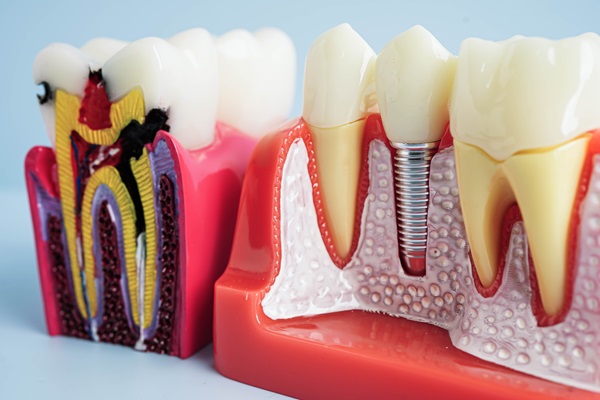6 Implant Dentistry FAQs About Multiple Tooth Replacement

Looking for information on implant dentistry? Whether only a few teeth or the complete row of teeth are missing, implant dentistry might be the best choice to restore the natural function and appearance of the smile. Before starting any major dental procedure, you would probably have many questions. This article provides answers to some of the frequently asked questions about the use of implants for multiple tooth replacement.
6 Frequently asked questions about implant dentistry
Dental implants are titanium posts that replicate the function of lost tooth roots. The implants are inserted below the gums. Over the following three to six months, these dental implants will integrate with the jawbone and gum tissue, becoming the solid support needed for replacement teeth.
1. What are the advantages of choosing implant dentistry?
Conventional options for replacing multiple teeth only restore the visible part of the smile, whereas implants restore both the roots and visible parts. The implant restoration will provide natural chewing functions and feel. Without the tooth’s root to stimulate the supporting jawbone and gum tissues, they start to diminish, causing further tooth loss, changes in facial shape, and other oral health issues.
2. How many implants are required for multiple tooth replacement?
The number of dental implants needed to replace multiple teeth depends on the number and location of the missing teeth. One or two implants can hold a fixed bridge to restore multiple teeth missing consecutively. Three to six implants can replace any number of lost teeth or a complete dental arch.
3. How long do implants need to heal?
Typically, it takes about four to six months for most dental implants to heal and integrate completely with the surrounding bone. However, one point to consider is that the duration of recovery can vary depending on a number of factors, including the density of the jawbone, as well as the number of implants inserted.
4. What is the cost of dental implants?
The cost of implant dentistry restoration options varies remarkably, based on certain factors, including the number of replacement teeth, the type of material, the need for preparatory treatments such as bone grafting, the need for sedation, and the degree of complication. The dentist will explain every aspect of the treatment procedure, cost, and available insurance coverage before beginning the treatment process.
5. What is the success rate of dental implants?
Dental implants have a success rate of up to 95 percent. However, success depends on certain factors. Keeping up with dental checkups and maintaining a good oral hygiene routine can significantly reduce the risk of implant failure. It is also important that the patient has sufficient jawbone health and density to support the implants.
6. How long will the implant restoration last?
Implant restorations are highly durable and can last for more than two decades. They require the same care and maintenance as natural teeth. With proper care, many patients have their implants for a lifetime.
Do you have multiple missing teeth?
Implant dentistry is not a one-size-fits-all procedure because every patient is unique. If you need more information or have questions, schedule a consultation appointment with our dentist to get answers.
Request an appointment here: https://www.olivefamilydentist.com or call Olive Family Dentistry at (818) 483-9069 for an appointment in our Burbank office.
Check out what others are saying about our dental services on Yelp: Implant Dentistry in Burbank, CA.
Recent Posts
Many who need dental implant and crown procedures put off the treatment of out fear that the procedure will be painful.Understanding what pain comes with the procedure can calm anxiety and allow those who are afraid to follow through with the treatment.Dental implant and crown placement involves some pain and soreness. That said, it may…
A reconstructive dentist specializes in restoring the structure, function, and aesthetics of teeth and gums compromised due to injury, disease, or wear. Many are unsure of when to seek their care, but recognizing the right time can make a significant difference in achieving a healthy, functional smile. Here are five signs and situations indicating that…
Most adults experience some degree of gum disease during their lifetime, but it does not necessarily lead to tooth loss. Understanding how to identify and treat the stages of this common ailment can prevent it from spreading and reduce its impact.Gum disease is an infection of the gum tissue surrounding the teeth. It starts with…
Enhancing the appearance of your smile is an important aspect of dental care, and cosmetic dentistry offers a variety of procedures to improve the aesthetics of teeth. Whether addressing discoloration, misalignment, or missing teeth, cosmetic dentistry provides tailored solutions that combine function and beauty. Understanding the most popular procedures in this field can help patients…


